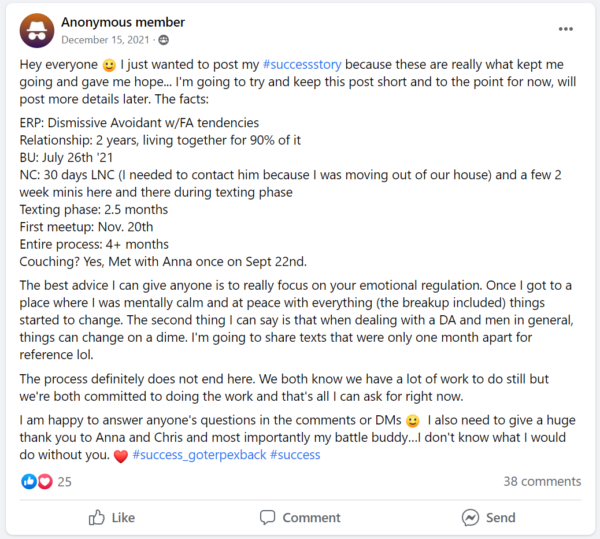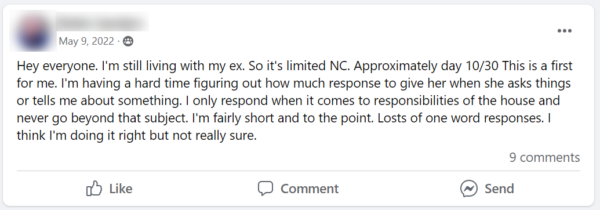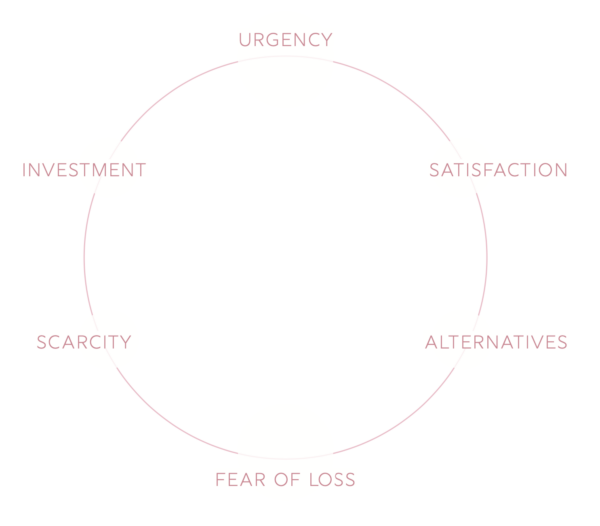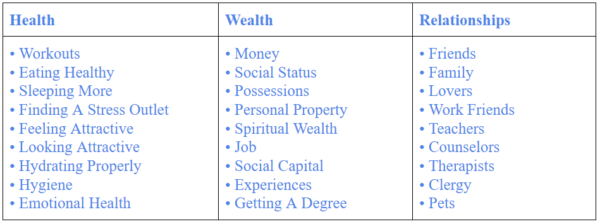I’ve decided to break down the major ground rules for living with an ex which I’m ashamed to say I haven’t ever done a guide on, even though it’s a prevalent question we always get.
In this guide, you’re going to learn,
- Why Your Overall Goal Doesn’t Matter
- If You Can Financially Afford To, Find Your Own Place And Move Out
- Treat It The Same Way You Would A Limited No Contact Rule
- No Sleeping Together
- Go Out On Dates With Other People (But Don’t Flaunt)
- Work On Your Magnum Opus
- Emotional Regulation (ACT: Acceptance And Commitment Therapy)
Let’s begin!

What Are Your Chances of Getting Your Ex Boyfriend Back?
Take the quizGround Rule #1: Why Your Overall Goal Doesn’t Matter
For a significant period in the history of Ex-Boyfriend Recovery, we differentiated between people who wanted their exes back and those who didn’t.
This distinction was particularly true in situations where individuals lived with their exes.
However, after years of interviewing numerous success stories and analyzing what distinguished them from unsuccessful cases, we discovered an intermingling of the two goals.
People who want their exes back tend to get their exes back by moving on from their exes.
Therefore, your overall goal for living with your ex, whether you want your ex back or not, is to get over your ex.
The approach is going to be the same, no matter what.
And that is the concept of letting go.
This sounds cliche, but the reality is that if you can let go, especially if you live with your ex, you give yourself the best chance of,
- Not only getting your ex back
- moving on from your ex.
So it’s really the two-birds, one-stone approach.
Therefore, we will have one set of strategies instead of trying to divide this into two distinct strategies based on your situation or goals.
Ground Rule #2: If You Can Financially Afford To, Find Your Own Place And Move Out.
This is the first ground rule I want to set concerning living with your ex.
And this is often a resistant thing for many clients to admit.
Many clients come to us under the guise of being dead set on winning their ex back.
But like I’ve just said, The best way to get your ex back is to get over your ex.
Yet, when you look at our success stories, specifically the people who were stuck living with their ex, it was actually in their best interest to move out and try to do the process from scratch.
Sure, living with your ex, while it does provide certain advantages, it is ultimately difficult to try no contact and strategies like that.
Check this out:
This specific success story, in particular, ended up living with their ex for 90% of their relationship, moved out of their house, and THAT’S when success started happening for them.

What Are Your Chances of Getting Your Ex Boyfriend Back?
Take the quizWhile we’re not entirely sure, either statistically or psychologically, why this is the most effective approach, it’s a common theme we’ve observed among people in this situation.
If you’re financially able, moving out from your ex is in your best interest.
My hypothesis: It provides a clean slate, allowing you to approach either winning them back or moving on without the constant reminder or distraction of their presence.
However, this advice only applies if you’re financially capable.
Most people can’t afford to move out on their own, so they remain living with their ex.
But don’t worry; I’ll attach a few screenshots from our community of people who found themselves in this very situation and have had successes.
Ground Rule #3: Treat It The Same Way You Would A Limited No Contact
There are actually three forms of no contact.
- There’s the traditional no contact: where you are not living with your ex, or you’re not working with them, and you decide to ignore them for 21 to 45 days and then reach out to them. There’s no communication whatsoever, barring a few particular circumstances.
- Then, of course, there is the indefinite no-contact rule: This is when you’re dead set on never getting back with your ex. You never want to talk to them again, so you go into no contact and ghost them forever.
- The third and final version of no-contact is the limited contact rule: This is where you want to do a no-contact rule, but you cannot do a full no-contact rule because you either live together with your ex, you work together with your ex, you go to school with your ex, or you share children with your ex. Any situations in which you are forced to talk with your ex will put you under a limited no-contact rule.
Now the rules of a limited no contact are quite simple.
You will only” break no contact” when you absolutely have to.
Examples include:
- Your ex is asking you for help at work with things
- There’s an emergency with your kids.
- You get assigned together at school.
When you do end up interacting with them, you need to keep it strictly business.
To actually prove this point, I’m going to attach a screenshot,
This individual said they’re still living with their ex; they’re in a limited no contact or approximately 10 days into their 30-day limited contact.
And it’s a first for them.
They’re not quite sure how much response they give their ex when they ask or tell them about something.
And this is where limited no contact can get complex.
Most of the time, I’m finding people who are in limited, no contact, are living together.
And the rules of limited no contact when you’re living together are different than the limited no contact when you’re not living together.
For example, if you work with your ex, it’s pretty easy to implement a no-contact rule for the most part, except when you’re seeing your ex in person or are required to work with them.
And then, when you do, you must keep it strictly business.
If you find yourself living with your ex, keeping the relationship strictly professional is essential. No matter how you slice it, you’re bound to see your ex every single day.
We’ve found that more negatives can occur if you’re overtly rude or entirely ignore your ex in such circumstances.

What Are Your Chances of Getting Your Ex Boyfriend Back?
Take the quizTherefore, it’s beneficial to be pleasant and cheerful, yet concise and to the point, when you’re in a situation of limited contact while living together.
Take this individual’s situation in the screenshot above as an example. They ask if they should only respond to household responsibilities and avoid other subjects. They keep his responses relatively short and to the point, often using one-word answers. And they believe they are handling the situation correctly.
Honestly, they are though I’d make one tiny little change.
They don’t need to restrict themselves to only one-word responses when living with their ex.
It’s beneficial to engage minimally, provided you keep the conversation strictly about the matter at hand and avoid topics such as your past relationship or even unrelated issues like the weather.
Stick to the subject, then move on with your day.
Ground Rule #4 No Sleeping Together
This should seem obvious, but it’s something that I really want to highlight because you are living with your ex. When you live with your ex, there are ample opportunities to fall back into old habits.
Now some people will falsely believe that if they can sleep with their ex again, all of the feelings of the old relationship will return.
Yet I would say in the vast majority of cases I’ve seen who actually try this strategy out, it does not work for them.
Why?
I think it has much to do with the friends-with-benefits scenario.
Basically, what you’re saying with your actions when you do this with your ex is:
It’s okay for you to break up with me or that we’re broken up, but we can always do more. I’m willing to cross that line. I’m willing to become friends with benefits.
And once you’re friends with benefits, they don’t necessarily look at you so much like a relationship to commit to.
Sometimes they do.
I mean, let’s be honest here.
But most of the time, they do not. And when you’re in a friends-with-benefits scenario, especially living with them, it becomes tough to dig out of that hole.
This is one of the other big reasons why we think it’s important for you to move out or find some new place of your own if you’re financially able to support yourself.
Ground Rule #5: Go Out On Dates With Other People
This is important as it signals that you’re moving forward.
However, it’s crucial to refrain from flaunting these outings. Let your ex’s imagination fill in the blanks.
Interestingly, you don’t necessarily need to go on actual dates.
Simply leaving the house often and spending time with friends can create the impression that you might be dating.

What Are Your Chances of Getting Your Ex Boyfriend Back?
Take the quizBut remember not to flaunt it;
Less is more.
There are some intriguing examples where this approach has worked for our customers.
For instance, our very own coach Shauna, one of our initial success stories who used our program and worked with my wife, is now married to her ex, and they have two children together.
What’s notable about her case is that my wife’s advice was essentially the same as suggesting she go out on dates with others.
However, it wasn’t a direct comparison.
Shauna and her ex were either living together or shared custody of their children at the time of the breakup.
My wife advised Shauna to go out, perhaps on dates or to the gym, and leave the kids with her ex.
This was to help him realize the challenges of caring for children alone. The idea was to make him miss her presence. Shauna did that, leaving the kids with him for a few hours while she went out.
Gradually, this approach began to work. Anyone with young children can attest to the difficulty of looking after them single-handedly.
But there’s something more complicated at work here. Imagine you are left watching your partner’s kids, terrified that that partner is out on a date with someone else.
I’ve talked a lot in the past about the six commitment factors.
- Satisfaction
- alternatives
- investment
- urgency
- scarcity
- fear of loss
Going on a date with other people creates fear of loss.
And if you don’t think that matters because your ex broke up with you.
It does because a lot of times, I’ve found that people who break up with you still think they can get you.
And if you’re going on a date with other people, you’re proving that assumption incorrect.
And that’s often all it takes.
Ground Rule #6: Work On Your Magnum Opus
One of the significant issues we often encounter with our clients is that they tend to be overly codependent. Their entire world seems to revolve around their ex.
Their ex is aware of this, and often, it’s one of the primary reasons for the breakup.
I usually use this graphic to illustrate how your ‘solar system’, instead of revolving around you, is centered on your ex.
We need to shift this so that you become the center of your own ‘solar system’ once again. It’s an odd analogy, I know, but that’s how I perceive it.
And one of the best ways to do that is to find something you care about just as much as your ex.
And the fact that you’re living together means your ex can see you working on this. They can see your passion for this thing. And this passion should be directed toward your magnum opus.
Now, the magnum opus is basically your life’s work.
What you want to be remembered for when you die.
This is going to be your greatest achievement in the world.
And I’ve argued to people that if you’re having difficulty finding your magnum opus, it’s usually as simple as finding the intersection of the holy trinity.
The holy trinity is a concept that basically divides your life into three distinct categories.
- Health
- Wealth
- Relationships
The magnum opus is the intersection of these three categories.
It’s one thing that you can do that will positively impact all three areas.
- It will positively give you money.
- It will positively help your mental health or physical health.
- Or it will positively help you find individuals or connect you with individuals that you never thought you would have the opportunity to meet. And they, in turn, can enrich your life.
This is the key to differentiating yourself so that you are not as codependent as your ex believes you to be. But also, you can work furiously on something you care about just as much as your ex.
Ground Rule #7: Emotional Regulation
This final ground rule is something that one of our clients suggested.
So this client said the best advice I can give anyone is to focus on emotional regulation. Once I got to a place where I was mentally calm and at peace with everything, the breakup included, things started to change.
Once again, parroting that concept of moving on that I talked about at the beginning of this article seems to be the best approach to getting your ex back.
But I would like to dig deeper here because I think when you’re looking at emotional regulation, just me telling you to move on is not usually enough.
Instead, I think one of the best approaches is to engage in ACT therapy (Acceptance and Commitment Therapy).
This is an evidence-based therapy.
And basically, the premise is that specific negative experiences like pain, grief, disappointment, illness, and anxiety are inevitable parts of human life.
And the goal of this therapy is to help individuals adapt to these challenges by developing psychological flexibility rather than trying to eliminate or suppress undesirable experiences.
According to Psychology Today, there are six core processes of acceptance and commitment therapy.
- Acceptance: This involves recognizing and embracing the full range of one’s thoughts and emotions, instead of attempting to avoid, deny, or change them.
- Cognitive Defusion: This strategy encourages individuals to distance themselves from, and alter their reactions to, distressing thoughts and feelings, thus reducing their harmful effects. Techniques might include observing a thought without judgment, singing the thought, or labeling automatic responses.
- Being Present: This involves mindfulness in the present moment and observing thoughts and feelings without judging them or trying to change them. Clear and direct experience of events can foster behavioral change.
- Self as Context: This concept broadens the notion of self and identity. It suggests that individuals are more than just their thoughts, feelings, and experiences.
- Values: This involves choosing personal values in various life domains and striving to live according to these principles. This contrasts with actions driven by the desire to avoid distress or to comply with others’ expectations.
- Committed Action: This involves taking tangible steps to integrate changes that align with one’s values, leading to positive change. This could include goal setting, exposure to challenging thoughts or experiences, and skill development.
Ultimately ACT therapy might be one of the best tools I can point you in the direction of to help regulate your emotions.





Trish
October 5, 2024 at 11:25 pm
I don’t agree with the sneaky going out with other people & letting the ex’s “imagination fill in the blanks”. That can cause not only a lot of hurt to the ex who is being deceived (and who will eventually find out), but it is also very dishonest & therefore dishonoring to the ex.
I believe that it is always healthier to be up front with your ex rather than have your ex feel broadsided. Feeling betrayed & dishonored in that way can lead to pain and possibly even explosive reactions.